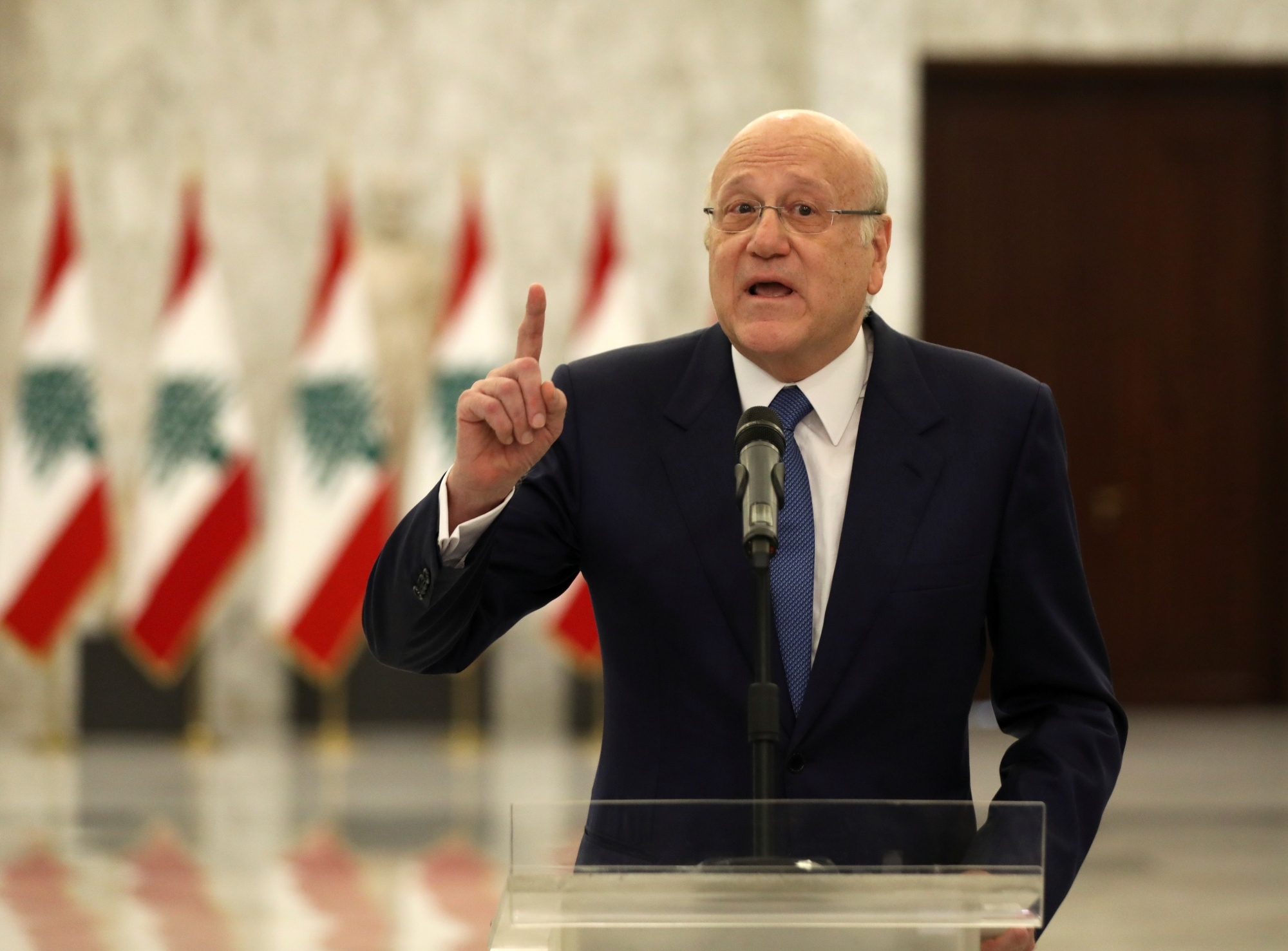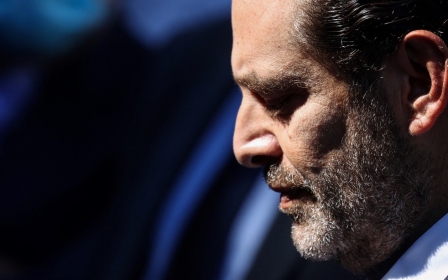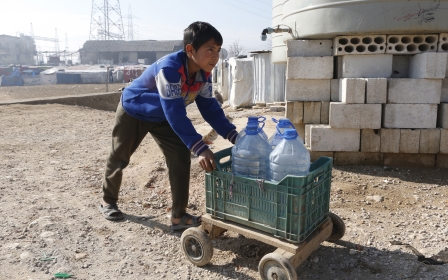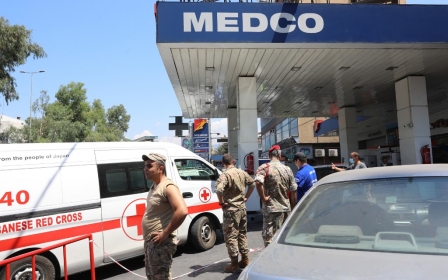Lebanon agrees on new government after year-long political paralysis

The formation of a new government in Lebanon was agreed on Friday, after more than a year of political paralysis in the country following the resignation of the previous cabinet in the wake of the Beirut port explosion.
Lebanon's prime minister-designate, Najib Mikati, met with President Michel Aoun early on Friday afternoon to finalise the formation of the much-delayed cabinet, a top presidency official told AFP.
The presidency announced shortly afterwards that a government had been formed.
Translation: President Aoun and Prime Minister Mikati signed the decree to form the new government in the presence of Parliament Speaker Nabih Berri.
New MEE newsletter: Jerusalem Dispatch
Sign up to get the latest insights and analysis on Israel-Palestine, alongside Turkey Unpacked and other MEE newsletters
The new government will hold its first meeting on Monday, an official told Reuters.
"The situation in the country is difficult," Mikati said in a speech after signing the decree. "I hope I can stop the collapse and bring prosperity back to the country."
But Mikati added that the Central Bank no longer had enough reserves to maintain subsidies, calling on people in Lebanon to "tighten their belts". Three quarters of the country's population have already been forced into poverty by a severe financial crisis since late 2019.
Minister lineup
Mikati, who has been prime minister twice before and is the country's richest man, was charged on 26 July with forming a government after his two predecessors - Mustapha Adib and Saad Hariri - threw in the towel.
After 46 days of deliberations, Lebanon's 77th government was put forward on Friday, representing most political currents in the country.
While admitting that the new government “is not perfect” and fell short of demands by the French initiative for a politically neutral cabinet, Mikati said it would “make sure to deal with all the challenges”.
“We can overcome all the obstacles if we work together,” he added.
Youssef Khalil, a senior central bank official and aide to its controversial governor, Riad Salameh, was named finance minister - perhaps one of the most sensitive roles given the country's current economic collapse.
The 24-member government includes only one woman - Najla Riachi.
Lebanon's new government
+ Show - Hide- Najib Mikati, prime minister
- Saade al-Shami, deputy prime minister and member of the Syrian Socialist National Party (SSNP)
- Bassam Mawlawi, minister of interior and municipalities, close ally of Mikati
- Youssef Khalil, minister of finance, former head of operations for Lebanon’s Central Bank and nominated by Berri
-Amin Salam, minister of economy and trade, nominated by Mikati
- Abdallah Abu Habib, minister of foreign affairs, nominated by Aoun
- Walid Fayyad, minister of energy and water, nominated by Aoun
- Johnny Korm, minister of communications
- Abbas Halabi, minister of education and higher education, nominated by Progressive Socialist Party leader Walid Jumblatt
- Henri Khoury, minister of justice, nominated by Aoun
- Firas Abiad, minister of health, head of Rafic Hariri governmental hospital, nominated by former prime minister Saad Hariri
- Brigadier General Maurice Slim, minister of defence
- Nasser Yassin, minister of the environment, nominated by Hariri
- Ali Hamiye, minister of public works and transport, former advisor for Hezbollah MP Hussein Hajj Hassan
- Hector Hajjar, minister of social affair, nominated by Aoun
- Mustafa Bayram, minister of labour, nominated by Hezbollah
- Walid Nassar, minister of tourism
- Abbas Hajj Hassan, minister of agriculture, nominated by Berri
- Mohamad Mortada, minister of culture, nominated by Berri
- George Debakian, minister of industry, nominated by the Armenian Tachnag party close to Aoun
- Najla Riachi, minister of state for administrative development affairs, nominated by Aoun
- George Kordahi, minister of information, former host of the Arabic version of the show Who Wants to be a Millionaire?
- Issam Sharaf El-Din, minister of the displaced, nominated by Lebanese Democratic Party head Talal Arslan
- George Kallas, minister of youth and sports.
Nasser Yassin, the newly appointed minister of the environment, told Middle East Eye that since 2019, “previous governments quickly shifted from crisis management mode to firefighting mode”.
The challenge, he added, is now to produce a roadmap to guide the country out of its deep crises.
“It is true that recovery will take years, but we need to start somewhere - and for this to be done, we need to start negotiations with international institutions like the World Bank and the International Monetary Fund," Yassin said, adding that the new government would need to overcome the country’s deep political polarisation.
Country in crisis
Hariri, who resigned as designate premier in July after nine months of unsuccessful negotiations to put together a cabinet, welcomed the news on Friday.
Translation: Finally, after 12 months of vacuum, our country has a government. All support for Prime Minister Mikati's state in the vital mission to stop the collapse and launch reforms.
“After 13 months of attempts to form a government, local and international wills coincided,” Jean Aziz, a political analyst and former Aoun advisor, told MEE, adding that Hariri’s attempt had been hindered by a lack of support from his Saudi allies.
Aziz predicted that the government’s primary aim would be to boost the standing of Lebanon’s political apparatus, heavily damaged in the wake of the October 2019 uprising and the port explosion, in part by “doping the impoverished Lebanese population by releasing withheld international monetary aid until parliamentary elections take place next May”.
But Sami Nader, a Lebanese political analyst, argued there was little hope for a breakthrough if the dynamics that prevailed during the cabinet lineup negotiations remained in place.
"The continuation of quota politics and bickering over every reform and decision would mean no departure from what the caretaker government was able to do," he told AFP. "It was the same cooks who formed this government, so can they offer a different meal?"
The United States on Friday welcomed Lebanon's formation of a government and called for it to take "urgent action" to reform a battered economy.
"The United States welcomes the announcement that Lebanon's leaders have agreed to form a new government under the leadership of Prime Minister-designate Najib Mikati, offering hope that urgent action will be taken to address the dire needs and legitimate aspirations of the Lebanese people," State Department spokesman Ned Price said in a statement.
"We urge quick approval by the parliament so that this new government can get to work on concrete reforms to address Lebanon's deteriorating economic situation."
Lebanon has been run by a caretaker government since 10 August 2020, when then-prime minister Hassan Diab and his cabinet resigned en masse following the blast that devastated entire neighbourhoods of the Lebanese capital and killed over 210 people.
The explosion has been largely blamed on the country’s political class - many of whom were militia leaders during the 1975-1990 civil war - whose corruption is widely believed to have led to thousands of tonnes of ammonium nitrate being stored in unsafe conditions in the heart of Beirut for years.
'It was the same cooks who formed this government, so can they offer a different meal?'
- Sami Nader, political analyst
An investigation into the blast has meanwhile proceeded at glacial pace, with MPs stalling a vote on the investigating judge’s request to lift immunity from prosecution for political figures and high-level security officials suspected in the case.
Already struggling financially, the country has only further descended into economic turmoil since the explosion.
The Lebanese currency has lost 90 percent of its value since late 2019, and shortages in fuel, medicine and basic needs have become widespread. Lebanon can no longer provide mains electricity to its citizens for more than a few hours a day, nor can it afford to buy the fuel needed to power generators.
Meanwhile, very few of the international community's demands for a broad programme of reforms have been met, hampering the disbursement of foreign assistance.
Mikati said on Friday that his government would push forward with parliamentary elections due next year.
While many in Lebanon are pinning their hopes on the ballot bringing in fresh blood, others doubt meaningful change can prevail with the same sectarian electoral system.
Middle East Eye delivers independent and unrivalled coverage and analysis of the Middle East, North Africa and beyond. To learn more about republishing this content and the associated fees, please fill out this form. More about MEE can be found here.




